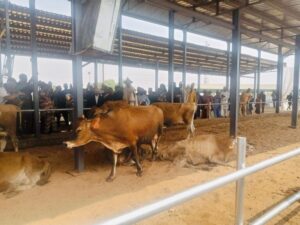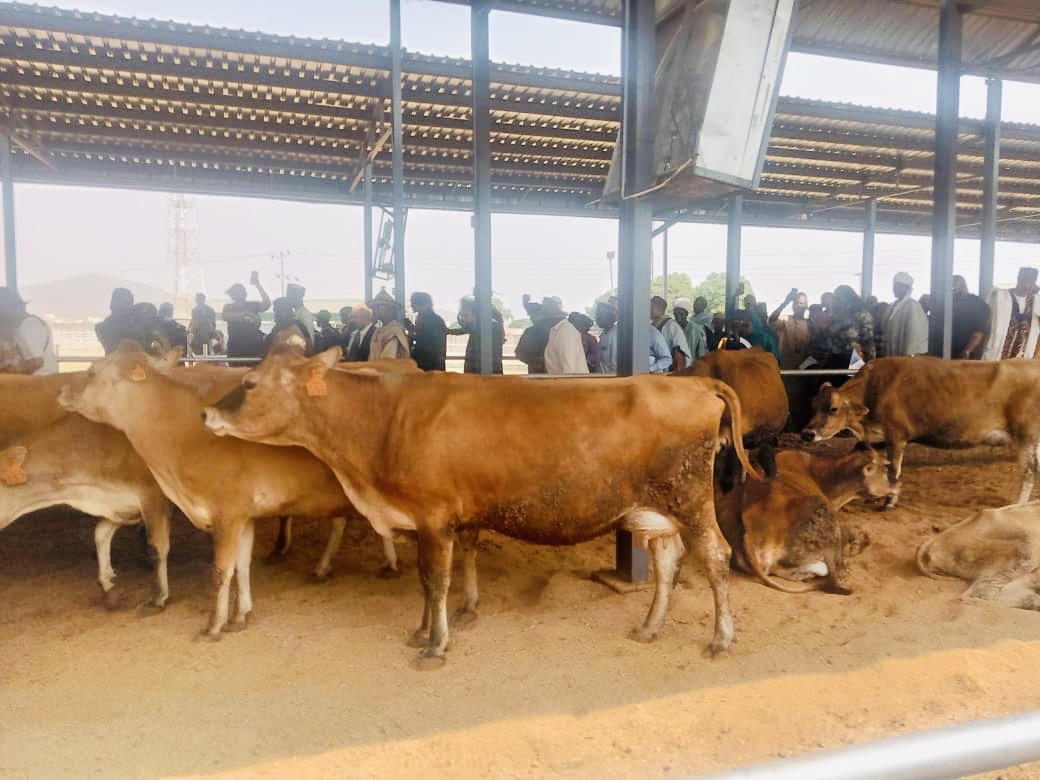By Felicia Imohimi
Nestlé Nigeria has invested over N1.8 billion to enhance the livelihoods of pastoralists in and around the Paikon Kore Grazing Reserve in the Federal Capital Territory.
Mr Wassim Elhusseini, Managing Director of Nestlé Nigeria Plc, announced this on Thursday in Abuja at the unveiling of the Nestlé Dairy Demonstration Farm under its Nestlé Livestock Development Project (NLDP).
Elhusseini explained that the NLDP, implemented in collaboration with CBI Innovations and 2SCALE since 2019, is structured around three pillars: better milk, better feed (fodder), and resilient communities.
“The NLDP project has invested N1,858,000,000 and currently aggregates an average of 6,000 litres of fresh milk per day from 1,600 dairy households.
“The project ambition is to aggregate 30,000 litres of milk per day by November 2027 by improving local breeds and applying best dairy farming practices,” he said.
He noted that milk producers participating in the programme had seen an increase in their household monthly income, from N70,000 to N250,000 between 2021 and 2024.
This growth, he said, was driven by improved dairy practices and the provision of enabling infrastructure within the community.
He added that milk collection at the Paikon Kore centre had increased from an initial 200 litres on 1 June 2021 to an average of 6,000 litres.
“To date, the project has aggregated over one million litres of raw milk, benefiting 3,000 milk producers who are part of the 83 successful dairy cooperatives established under the NLDP.
“This increase in productivity is a direct result of training over 2,000 pastoralists in dairy practices, vaccinating over 36,000 cattle, and constructing 19 boreholes and 28 water troughs to ensure consistent access to water.
“We are establishing a practical model for implementing best dairy practices that will further consolidate and sustain the success of the NLDP, fostering sustainable prosperity for our community of milk producers, aggregators, and farmers,” he added.
Elhusseini stated that the initiative had significantly improved milk quality, reducing rejection rates from 12 per cent in 2021 to five per cent in 2024.
He reaffirmed the company’s goal to achieve a critical mass of 30,000 litres of milk production per day by November 2027 across the FCT and its adjoining dairy farm clusters.
He emphasised that this effort would make a huge contribution to regional food security.

The Minister of Livestock Development, Idi Maiha, commended Nestlé for its commitment to sustainable agricultural practices.
He described the dairy farm as a key milestone in Nigeria’s journey towards food security, economic growth, and sustainable livestock development.
Maiha identified the project’s benefits, including enhanced productivity through climate-smart sustainable practices, capacity-building for local farmers, and a reliable source of income for thousands of rural families via the Paikon Kore milk collection hub.
He, however, pledged the ministry’s commitment to tackling major industry challenges, such as infrastructure deficits, limited access to finance, and the need for improved veterinary services.
Olusoji Apampa, Chief Executive Officer of CBI Innovations Ltd (CBIIL), described the unveiling as the beginning of a transformative era in Nigeria’s dairy industry, demonstrating a commitment to excellence and sustainability.
Apampa said the dairy farm serves as a testament to “our dedication to sustainable milk use and quality, supported by robust herd health practices, effective livestock management, and breed improvement.
“It is enhanced by technology to minimise the impact on production economies while nurturing the environment and bolstering the local economy”.
He revealed that the animal population on the farm had increased from 20 to 71 cattle over the past year and eight months.
“By employing artificial insemination, we have ensured that our use of technology improves livestock well-being, enhances operational efficiency, and elevates the quality of milk production.
“From automated well, semi-automated—milking systems to sustainable waste management practices and improved animal feed, we have left no stone unturned in our pursuit of excellence,” he said.
Lawan Geidam, Mandate Secretary for Agriculture and Rural Development at the FCTA, stated that the project aligns with President Bola Tinubu’s Renewed Hope Agenda, which seeks to foster economic growth and national development. (NAN) www.nannews.ng
Edited by Tosin Kolade












